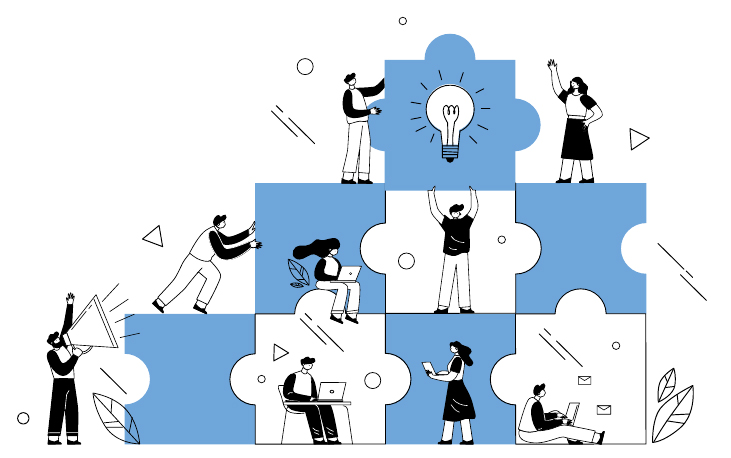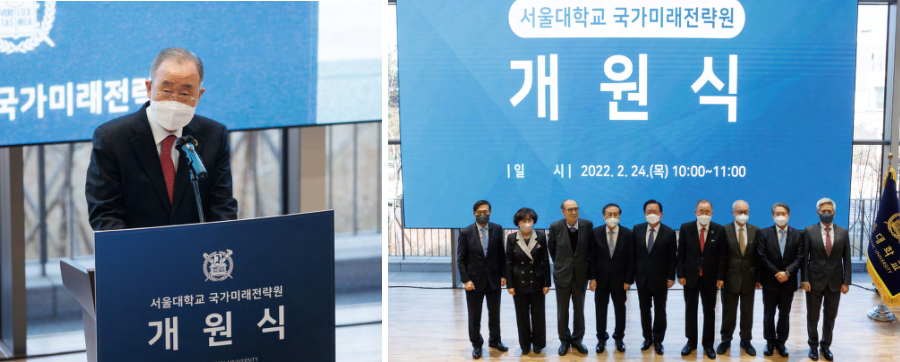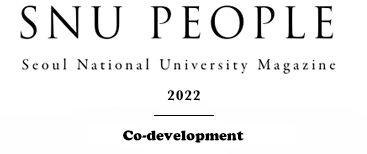SNU NOW
Presenting a Vision for the Community
SNU opens the Institute for Future Strategy

The Seoul National UniversityвҖҷs Institute for Future Strategy (Director Byung-Yeon Kim) has commenced its activities in earnest after holding its opening ceremony in February. The Institute for Future Strategy was established by expanding and reorganizing the characteristics of the previous National Strategy Commission. The institute plans to seek domestic and international social visions and present policy directions through convergence research in diverse fields.

Development of National Strategies Through Multidisciplinary Research
Since 2016, Seoul National University has discussed major social policy tasks and directions through the National Policy Forum. The National Strategy Commission was established in August 2019 to serve as a think tank in addition to its role as a public forum managed by the National Policy Forum, and the commission has suggested government policy alternatives in collaboration with various research institutes. The Institute for Future Strategy follows the National Strategy CommissionвҖҷs directions and aims to contribute to the communityвҖҷs prospects and strategies by growing as a more systematic and stable organization.
вҖңWe will conduct nonpartisan, convergent, and evidence-based policy research through research clusters,вҖқ stated Byung-Yeon Kim, director of the Institute for Future Strategy. He added, вҖңWe plan to focus primarily on the changes in world order and the future of the Korean Peninsula, low birth rates and the aging population, democracy, the pandemic crisis, and the future of science and technology.вҖқ


The Five Key Tasks for the Future
The Institute for Future Strategy plans to engage in core domestic and foreign policy issues, focusing on research clusters that are fluidly constructed according to research tasks. Currently, the institute has formed five research clusters under the themes of <Changes in world order and the future of the Korean Peninsula>, <Population issues such as low birth rates and aging>, <Democratic crisis>, <Global pandemic>, and <The future of science and technology>. These are represented by the professors Sohn In-joo (Department of Political Science and International Relations), Lee Chulhee (Department of Economics), Ryu Honglim (Department of Political Science and International Relations), Yim Jae-Joon (College of Medicine), and Lee Jeong-Dong (Technology Management, Economics, and Policy Program), respectively.
First, <Changes in world order and the future of the Korean Peninsula> will establish strategies through interdisciplinary research to actively contribute to the reorganization of world order external to the Korean Peninsula, which was reborn as a global powerhouse in the 21st century. This research cluster will also focus on science and technologyвҖ”the key to future survival and prosperityвҖ”from the perspective of a global security alliance. Second, <Population issues such as low birth rates and aging> will focus on conducting the basic research necessary for establishing policies to respond to low birth rates and aging issues. The aim will be to develop a network between researchers and research centers both inside and outside of Seoul National University to share and promote new research results and ideas. Third, <Democratic crisis> will fundamentally reflect on and seek innovative measures for the future of democracy which has settled as a way of life and a political ideal. Fourth, <Global pandemic> will identify the problems faced by the Republic of Korea due to COVID-19, and experts will discuss these problems from various perspectives. Fifth, <The future of science and technology> aims to contemplate what technologies will allow Korea to occupy a unique position in the international community ten to twenty years into the future and what social capabilities it possesses in this regard.
The Institute for Future Strategy aims to share the scholastic achievements of various academic fields with society. Accordingly, it plans to regularly hold presentations, lectures, and discussions to inform each cluster's research contents and publish and release reports to the public every two to three years.

